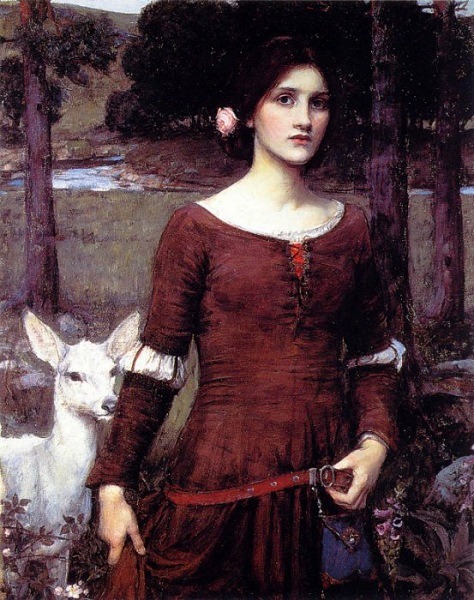The Lady Clare (1900), by J.W. Waterhouse Waterhouse was a fan of Alfred Tennyson and used his poems
The Lady Clare (1900), by J.W. Waterhouse Waterhouse was a fan of Alfred Tennyson and used his poems as subject for several of his paintings. The poem with the same title as this painting was published in 1842 (together with The Lady of Shalott and Mariana in the South) and describes the victory of true love over class. Lady Clare appears on her wedding day in a peasant’s dress to reveal her poor heritage to her rich lover – Waterhouse liked to paint women taking destiny in their own hands. Fortunately, Lord Ronald decides to marry her anyway so this story has a happy ending.The painting was exhibited to support impoverished colleagues and raised £450 when it was sold to the barrister Ernest Moon.The Lady Clare It was the time when lilies blow, And clouds are highest up in air, Lord Ronald brought a lily-white doe To give his cousin, Lady Clare. I trow they did not part in scorn- Lovers long-betroth’d were they: They too will wed the morrow morn: God’s blessing on the day! ‘He does not love me for my birth, Nor for my lands so broad and fair; He loves me for my own true worth, And that is well,’ said Lady Clare. In there came old Alice the nurse, Said, 'Who was this that went from thee?’ 'It was my cousin,’ said Lady Clare, 'To-morrow he weds with me.’ 'O God be thank’d!’ said Alice the nurse, 'That all comes round so just and fair: Lord Ronald is heir of all your lands, And you are not the Lady Clare.’ 'Are ye out of your mind, my nurse, my nurse?’ Said Lady Clare, 'that ye speak so wild?’ 'As God’s above,’ said Alice the nurse, 'I speak the truth: you are my child. 'The old Earl’s daughter died at my breast; I speak the truth, as I live by bread! I buried her like my own sweet child, And put my child in her stead.’ 'Falsely, falsely have ye done, O mother,’ she said, ’ if this be true, To keep the best man under the sun So many years from his due.’ 'Nay now, my child,’ said Alice the nurse, 'But keep the secret for your life, And all you have will be Lord Ronald’s, When you are man and wife.’ 'If I’m a beggar born,’ she said, 'I will speak out, for I dare not lie. Pull off, pull off, the brooch of gold, And fling the diamond necklace by.’ 'Nay now, my child,’ said Alice the nurse, 'But keep the secret all ye can.’ She said, 'Not so: but I will know If there be any faith in man.’ 'Nay now, what faith?’ said Alice the nurse, 'The man will cleave unto his right.’ 'And he shall have it,’ the lady replied, 'Tho’ I should die to-night.’ 'Yet give one kiss to your mother dear! Alas, my child, I sinn’d for thee.’ 'O mother, mother, mother,’ she said, 'So strange it seems to me. 'Yet here’s a kiss for my mother dear, My mother dear, if this be so, And lay your hand upon my head, And bless me, mother, ere I go.’ She clad herself in a russet gown, She was no longer Lady Clare: She went by dale, and she went by down, With a single rose in her hair. The lily-white doe Lord Ronald had brought Leapt up from where she lay, Dropt her head in the maiden’s hand, And follow’d her all the way. Down stepped Lord Ronald from his tower: 'O Lady Clare, you shame your worth! Why come you dressed like a village maid, That are the flower of the earth?’ 'If I come dressed like a village maid, I am but as my fortunes are: I am a beggar born,’ she said, 'And not the Lady Clare.’ 'Play me no tricks,’ said Lord Ronald, 'For I am yours in word and in deed. Play me no tricks,’ said Lord Ronald, 'Your riddle is hard to read.’ O and proudly stood she up! Her heart within her did not fail: She look’d into Lord Ronald’s eyes, And told him all her nurse’s tale. He laugh’d a laugh of merry scorn: He turn’d and kiss’d her where she stood: 'If you are not the heiress born, And I,’ said he, 'the next in blood- 'If you are not the heiress born, And I,’ said he, ’ the lawful heir, We two will wed to-morrow morn, And you shall still be Lady Clare.’ Alfred, Lord Tennyson -- source link
Tumblr Blog : jw-waterhouse.tumblr.com
#painting#symbolism#pre-raphaelite#alfred tennyson#poetry#lady clare#true love
